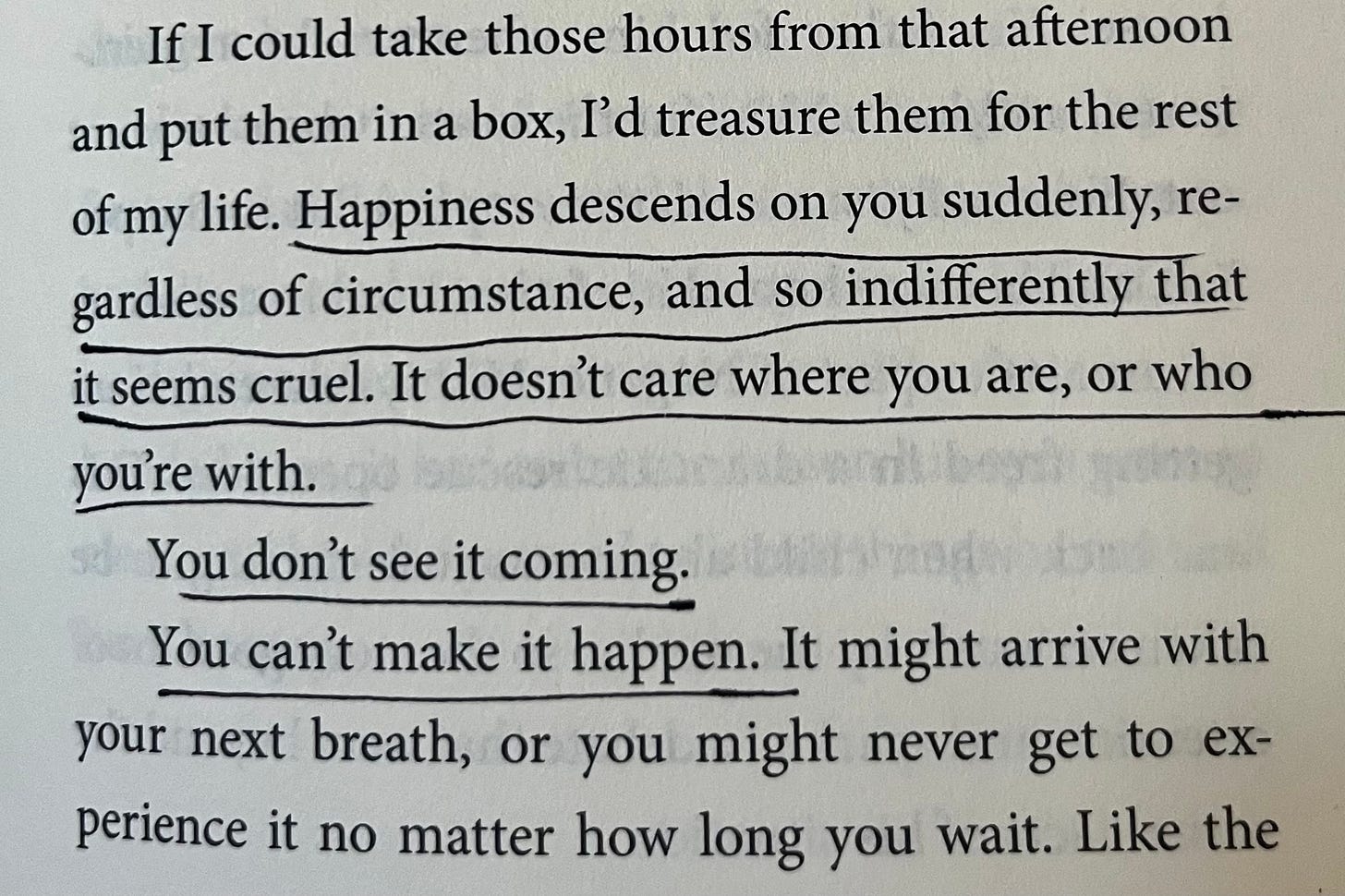it's ok to write about the same thing over and over
an exploration of niches, writer's block, and writing about the same things inspired by a reflection on banana yoshimoto's work.
my relationship with Japanese prose began, as it did for many people, with haruki murakami’s work.
I remember seeing my mom reading What I Talk About When I Talk About Running back when I was in middle school. I never read it, despite often picking up whatever the adults around me were reading, and she later said that she didn’t like it, so I didn’t feel like I missed out on much.
then, years later, in high school I stumbled upon Norwegian Wood in the library, and having recognized the author (though I knew nothing about him) I decided to pick it up. little did I know it was going to become one of my favorite books of all time. (I know a lot of people have issues with it, and valid criticisms of the book and murakami’s work as a whole but I can’t deny how much it affected me at the time I read it).
afterwards I also picked up Men Without Women from the library and enjoyed that book as well.
as a long-time manga reader and anime enjoyer already, the Japanese style of writing was familiar (and dear) to me. I could recognize a certain atmosphere that can be felt across all of Japanese fiction: it is surreal in the way it captures mundanity; there’s something spiritual yet so rooted in reality in it. Japanese fiction has a way of being nostalgic, even in the present tense, and to take life for all its joys and all its traumas at face value. something about that raw honesty, that’s somehow dreamy and mysterious at the same time is just so comforting to someone like me, who doesn’t like sugarcoating but is also an optimist. even in the darkest of Japanese stories, you can feel hope and even the happiest of them you can feel melancholy.
banana yoshimoto is no exception.
my journey with her work began at the end 2022, when her short story collection Dead-End Memories had just come out in bookstores near me. it had been years since I bought a book or read a book for leisure (since starting college in 2020) but something about that short story collection was drawing me in. I didn’t know anything about the author, or what the book was going to be about, but I was at the register paying for it before I even realized what I was doing.
the short stories ended up being about women of different ages, different walks of life, and their overcoming trauma in different ways. it touched me in ways I never expected it to and healed me when I needed it most. the book is full of annotations and underlines in pen, which I usually hesitate to do in my books, in case I give them away, or resell them later on, but I was 100% confident that Dead-End Memories would stay a part of my personal library for a long time.
then, I took a break from yoshimoto’s work for about a year, as I shifted my attention on to mieko kawakami’s writing. I read Heaven, Breasts and Eggs and All the Lovers in the Night before I came back to yoshimoto.
the next book of hers that I devoured was Goodbye, Tsugumi and it very well might be my favorite yoshimoto book to date. it is about two cousins, one healthy and one ill, and their coming of age on the seaside. they have a complicated relationship full of rivalry and sisterly love, that the reader gets to witness and live through with Maria, the protagonist. as she grows up and moves away to a big city for college, she reflects on her childhood, and her relationship with Tsugumi, and when she comes back to the seaside for summer, events unfold that change both her and Tsugumi.
after Goodbye, Tsugumi, I was hungry for more of yoshimoto’s work so I got Kitchen from the library right away and dove right in. this one seems to be yoshimoto’s most praised and well-known novella, and while it is not my personal favorite, I could definitely see why.
“Mikage, the heroine of Kitchen, is an orphan raised by her grandmother, who has passed away. Grieving, she is taken in by her friend Yoichi and his mother (who was once his father), Eriko. As the three of them form an improvised family that soon weathers its own tragic losses, Yoshimoto spins a lovely, evocative tale” - from Goodreads
finally, most recently I read two more of yoshimoto’s books back-to-back within the same week - The Lake and N.P.
as I was reading them, I found myself reflecting on all 5 of the books I’ve read from banana yoshimoto so far, and I realized that all of them are essentially about the same few things. they are all written from the first-person points of view of young women, dealing with a loss or a trauma of another kind. it is often the loss of a parent, parental figure or a family member. then, by twists of fate they meet other people who might have experienced trauma as well. family - blood and chosen - is a huge theme all of these books. in the end, the heroines will have found their healing or be on their way to finding it and their journeys of the few transformative months (or years) between experiencing the loss or the trauma, to meeting new people in their life (or rediscovering old connections), to healing each other through love and compassion that only a chosen family can give you, is the bulk of the novels.
despite all of the books sharing these common themes and tropes, I couldn’t get enough of them. each one I related to in different ways, each character having something so human about them that I could breathe out in relief. there’s nothing wrong with me, I’m just as flawed a human being, as every other human being.
of course, yoshimoto brings something new and different into each book as well, from exploring transness and queerness, to cults, to chronic illness, to sexual assault, to incest, to suicide, she doesn’t shy away from these heavy topics and explores them with thoughtfulness and respect (in my opinion). each book explores a new facet of the same ideas of trauma, loss and healing, while expanding and adding more to it as well.
so, she’s got me thinking about my own blog here on Substack, as well as all of the writing that I’ve done, from my many academic papers to the thoughts hidden from the world in my multitude of journals. a lot of them are me ruminating on the same things - the same trauma, anxious thoughts, and wounds that I myself think I should “get over” by now.
but should I really? can you ever?
my most viewed video on YouTube is about processing emotions and the whole thesis is that we need to do a lot to process an emotion. we need to talk about our emotions and think them through and write them out and let them out physically and cry them out many times to process them just a little bit. and every time we do this, we cannot expect the thoughts to never come back again, only that each time they do that it will be a fraction less painful.
many people’s question was then “can we ever fully process painful emotions (aka get rid of them forever)?”
the truth is I don’t know, but I don’t think so. life will always include the good and the bad, so even as you process and heal some of traumas and wounds, you will have accumulated more, just by living life.
there’s nothing any of us can really do to prevent any future harm from ever coming to us, because a lot of the unfortunate things that befall people happen by pure chance.
that’s why I probably will never run out of things to write about on Substack about my life and my feelings, because no matter how boring of a life I try to live, some things will always be out of my control and as long as I still come out and interact with the world (which I love doing by the way, don’t get the wrong idea) there will always be feelings to process and negative emotions to deal with.
and even more broadly - whatever the thesis of your personal Substack is, no matter how niche it is, as long as you keep learning about it and keep interacting with it, I don’t think you’ll ever be at risk of running out of things to say, or ways to say the same thing differently or apply the same ideas differently.
also, you never know which new people could stumble upon your writings out in the wild, so never feel bad or like you’re not enough or your writing is boring for restating the same things. your old readers will not tire of hearing the same context, because it is a topic they care about, and your new readers need the context, to understand you as a writer.
finally, whenever you hit a writer’s block next time, you can ask yourself:
what is it that I always come back to writing about?
what is/are a common thread/s in all of my writing?
if all of my writing had one thesis, what would it be?
how can I restate my thesis again, but differently?
what have I already written about, that I could expand on?
I have no doubt that answering these questions will jog your own mind to think of more questions, or more things to write about.
and, if you haven’t already, check out banana yoshimoto’s work for yourself, and see how it makes you feel. I’d love to know.
until next time,
- sab.




I LOVEEEEE bananna yoshimoto, i've been on a japanese literature kick as well recently.
I get nervous when my writing all starts to overlap but then I realize I am just adding on and building up on my thoughts. We don't always need to start something new. Building upwards is just as important as building outward
fwiw Norwegian Wood is amazing (I know people have issues with guys who think it's amazing)